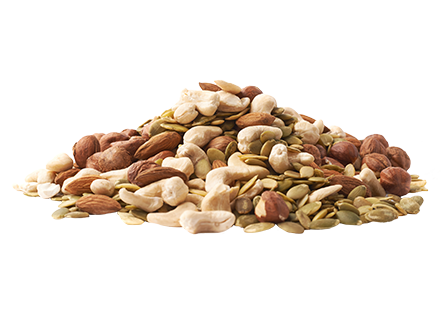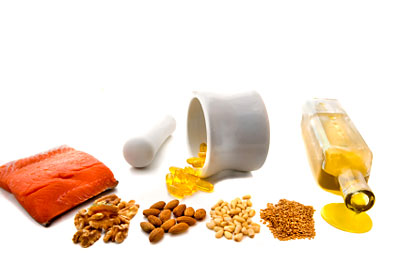Fighting Chronic Disease with Omega-3 Fatty Acids
April 28, 2024By: Megan Kigar
Categories: Live Healthy, Nutrition, Your Wellness

What classifies fats as “good” or “bad”? Fatty acids are organized into four groups: monounsaturated, polyunsaturated, saturated and trans fats.
Good Fats
Unsaturated fats are also known as “omegas”. Omega fatty acids play an important role in overall health. These “good” fats are essential for heart health, lowering risk for coronary artery disease and stroke, diabetes prevention, vitamin absorption, maintaining a healthy immune system, decreasing systemic inflammation, and promoting cell development. Good omega food sources include plant oils (olive oil, canola oil, peanut oil), fruits (avocados, olives), nuts (almonds, cashews, peanuts, walnuts) and fish (salmon, tuna, trout). These foods can help lower our bad cholesterol and raise good cholesterol.
Bad Fats
Saturated and trans fats raise “bad” cholesterol. These fats tend to be solid at room temperature thus can clog arteries after chronic intake. Increased consumption of these has been linked to cardiovascular and metabolic diseases. Foods containing these less-than-ideal fats include red meats, processed meats (hotdogs, sausages), whole fat dairy products, baked goods (desserts) and fried foods.
Omega Fatty Acids
 Omega fatty acids are broken down into three categories: omega-3, omega-6 and omega-9 fatty acids. Omega-3 fatty acids are considered essential nutrients because our bodies cannot make them. Therefore, we must consume omega-3 fats through our diets (foods and/or supplements). The American Heart Association recommends consuming at least 2 servings of fish each week to reduce your risk for heart disease. Individuals that have heart disease or consume little omega-3 foods may consider taking a supplement to promote heart, joint, skin health. Because there are so many different types of omega-3 supplements it is helpful to have a little guidance during your shopping endeavors.
Omega fatty acids are broken down into three categories: omega-3, omega-6 and omega-9 fatty acids. Omega-3 fatty acids are considered essential nutrients because our bodies cannot make them. Therefore, we must consume omega-3 fats through our diets (foods and/or supplements). The American Heart Association recommends consuming at least 2 servings of fish each week to reduce your risk for heart disease. Individuals that have heart disease or consume little omega-3 foods may consider taking a supplement to promote heart, joint, skin health. Because there are so many different types of omega-3 supplements it is helpful to have a little guidance during your shopping endeavors.
Omega-3
Three fatty acids make up the omega-3 family:
- Alpha-linolenic acid (ALA) found in walnuts, beans, and plant based oils (canola, soybean, flaxseed/linseed, and olive oils)
- Eicosapentaenoic acid (EPA), found in cold water fatty fish such as salmon, tuna, mackerel, sardines, herring
- Docosahexaenoic acid (DHA), found in fish and fish oil supplements
When reading a supplement label find the amount of DHA/EPA in each serving/capsule and the total amount of fish oil/lipids. Highly concentrated EPA/DHA supplements are the best choices for maximizing the health benefits. If you are interested in taking an omega-3 fatty acid supplement, talk to a health professional to find the right supplement for you.



